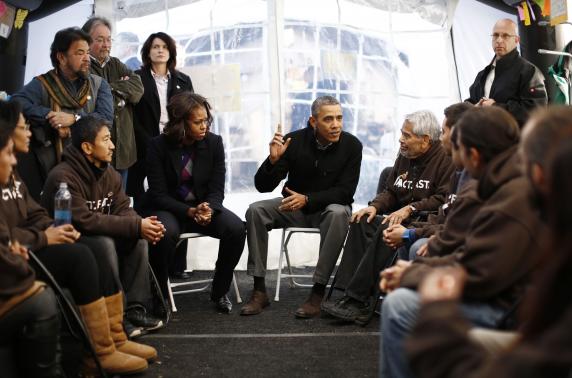(Reuters) – President Barack Obama’s decision on possible changes to U.S. deportation policy sets up an election-year skirmish that could help Democrats win points with their political base while irritating Republicans who are open to immigration reform.

The Obama administration is expected to announce revisions in the coming weeks to policies that determine how undocumented immigrants are selected for removal from the United States.
Advocates want sweeping executive actions since broad legislation to rewrite immigration laws is stalled in Congress.
But experts say the changes are likely to be modest as the White House holds out hope for a legislative fix this summer before November’s midterm congressional elections or next year when a new Congress has been seated.
Activists and congressional aides expect the Department of Homeland Security, which is reviewing the deportation guidelines, to focus on several areas.
Those include shortening the time period in which immigrants are considered new and face increased scrutiny for deportation, instituting deeper background checks of detainees when considering whether they must leave, and protecting immigrants who are serving in the U.S. military from the threat of removal.
The decision on how far to go creates a political dilemma for Obama.
Making massive changes would endear him to Hispanic voters who helped propel him to the presidency and are furious about the high number of deportations on his watch.
Taking symbolic but less far-reaching steps risks exacerbating disappointment from Latinos and others in his political base just as Obama wants them to turn out at the polls to elect Democrats in November.
This is about Obama getting pressure from his base and how far he can go to make sure that those people show up in 2014, said Lanae Erickson Hatalsky, director of social policy and politics at Third Way, a non-partisan think tank in Washington.
Taking any executive action at all, however, risks alienating the very Republicans Obama needs to attain his ultimate goal of passing a bill with a path to citizenship for some 11 million undocumented immigrants living in the country.
Republicans in the House of Representatives have said there may be interest in tackling immigration reform this summer. But Speaker John Boehner said any attempt to revise existing law without congressional approval will backfire.
MOBILIZING THE BASE
Strategists and even some former aides to the president believe Obama should disregard Republican objections and give a boost to Democrats with a big policy shift.
I think he should be more aggressive about making the case that ‘if you don’t act, I will,’ said Luis Miranda, a former White House aide who worked on immigration issues and is now managing director at MDC Strategies, a communications firm.
Kenneth Sherrill, a political scientist at New York’s Hunter College, said the likelihood of Republicans passing immigration reform this year was slim.
If the White House is really worried about antagonizing Republicans, it seems to me they’re nuts, he said. If they want to do well in November, they’ve got to antagonize Republicans in order to mobilize Democrats for the election.
Hispanics polled by Reuters/Ipsos between January 2012 and March of this year have consistently preferred Democrats’ handling of immigration compared with Republicans. But only 35 percent approved of the Democrats’ handling of the issue in March, the latest month for which data is available, compared with 44 percent polled around the time of Obama’s re-election.
That’s a problem for Democrats, whose base of younger and minority voters are historically less likely to vote in midterm years than Republican voters, who are typically older and white.
Latino voters can be motivated by movement on immigration issues even during midterms, said David Damore, a senior analyst at Latino Decisions, a political research firm that tracks political opinions of Latino voters. In 2010, anti-immigration stances by Republican Senate candidates in Nevada and Colorado spurred Hispanics to the polls, he said.
HOW FAR TO GO
The question for the administration, then, is how far to go.
Activists said Obama could expand the 2012 program known as deferred action that permitted children brought into the United States illegally by their parents to stay. The age cap for that could be raised, for example, or other groups could be added.
What they really want – and what Republicans fervently oppose – is a broad program that would let people who are not a priority for deportation come forward, go through background checks, pay a fee and get authorization to stay put.
That is unlikely to happen, and immigrants worried about being deported and their supporters in the Latino community are prepared to be disappointed.
Those minimum changes will not take away that fear and I don’t think they will satisfy anybody, said Richard Morales, detention prevention coordinator at PICO National Network, a community organizing group.
The advocates’ impatience has sometimes led to pushback from the White House. Obama appeared visibly frustrated at a meeting with them in February and said they should be directing their anger at Congress, several attendees told Reuters.
On the one hand, activists are never going to be happy, said Gabriela Domenzain, a former aide on Obama’s 2012 campaign and now a partner in the Raben Group, a lobbying group. This doesn’t solve the problem permanently that only passing legislation can do.
(Editing by Caren Bohan and Jan Paschal)





